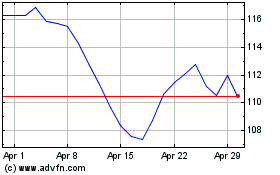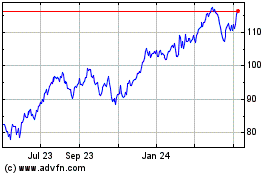By Jason Zweig
Morgan Stanley's takeover of E*Trade Financial Corp. for $13
billion shows how drastically the brokerage industry's business
model has changed.
Firms no longer want to offer investment products from all
sources. Instead, they want to milk their customers' cash and
manage all the assets themselves. Investors need to understand the
rules of the new game.
For decades, big banks and brokers aspired to become " financial
supermarkets" where consumers could open bank accounts and buy
stocks and bonds, mutual funds, insurance and the like.
In the 1980s, Prudential Financial Inc. sold securities
alongside insurance. American Express Co. pushed brokerage services
and financial advice to credit-card customers. In the 1990s,
Citigroup Inc. flogged stocks and mutual funds in its bank
branches. Even the retailer then known as Sears, Roebuck & Co.
sold securities in its department stores, earning the nickname
"Socks 'n' Stocks."
Some outfits -- especially Charles Schwab Corp. and Fidelity
Investments -- made one-stop-shopping work, managing money
themselves while offering funds from other firms as well.
But most flailed. Prudential paid more than $1.5 billion in
regulatory fines over sales of risky partnerships. American
Express, Citigroup and Sears sold their brokerage and fund
units.
Nowadays, the name of the game isn't to offer all things from
all sources to all investors. It's to offer only what keeps the
fees in-house.
Much as the Plains Indians used every part of the buffalo, from
flesh to skin to horn to sinew and hooves, Wall Street excels at
creating strategies with fees that can be harvested from every
component. In practice, that means investment firms want to grab as
much of your money as they can and farm out as little of it as
possible.
Wall Street can't make oodles of money off your trades anymore;
technology has driven commissions to near zero. And it can't make
the windfall it once did off managing portfolios; there, too,
market-tracking index funds and exchange-traded funds have become
cheap as dirt.
Where are the remaining profits for brokerage firms?
They can take your cash and, instead of investing it for your
benefit in the highest-yielding money fund or deposit account, they
can put it in their own bank and pay you peanuts. Then they lend it
out and keep the profit for themselves.
Morgan Stanley, E*Trade and Schwab all own banks to which they
route much of their customers' cash. E*Trade pays its customers
0.01% to 0.25% on their uninvested cash; Morgan Stanley, 0.03% to
0.2%; Schwab, 0.06% to 0.3%.
Brokerages have been pocketing 2% and up on that money (and you
can do almost as well, if you pull the cash from your brokerage
account and park it in a certificate of deposit or savings account
at the right online bank).
Schwab, which has hoovered up $220 billion in bank deposits,
earned 61% of its total net revenues in 2019 from the interest it
captured on those balances.
Financial firms can also invest your money in funds they run
themselves. That way, they capture fees you would otherwise pay to
somebody else.
By my estimate, 57% of the $16.5 billion in total assets of the
FlexShares ETFs, managed by an affiliate of Northern Trust Corp.,
are held by Northern Trust clients. The firm "adheres to an
open-architecture investment platform, applying the same objective
and rigorous selection process to third-party and proprietary
investment products," says a spokesman.
Even Vanguard Group, the investment giant owned by its fund
shareholders, is freezing out other firms. In its $161 billion
Personal Advisor Services program, which manages money for
individual clients, Vanguard won't recommend mutual funds or ETFs
from any other companies. Clients aren't compelled to sell their
non-Vanguard investments, says a company spokesman.
The house brand isn't always bad, of course. A firm's own funds
can be cheaper or better than the alternatives. But investors need
to be on their guard: Under federal rules, a firm can recommend its
store-brand investments whether they are ideal or not, so long as
they are a "reasonable" choice.
Finally, complexity pays -- for investment firms, if not their
clients. Take " structured notes." The return on these short-term
debt instruments is pegged -- often in complex ways -- to the
performance of other assets, often stocks or market indexes.
You can lose money, but issuance is booming; in less than one
hour on Thursday, banks and brokers filed nine prospectuses with
the Securities and Exchange Commission. Here again, firms often
hawk them to their own clients.
Structured notes are a fee bonanza. Firms rake in upfront
charges of 1% to 4.5%. They earn more fees for calculating the
value of the notes. They also can make money by trading against the
assets the structured products are linked to. There's generally no
market, so if you need to sell before maturity, the firm will buy
your note at a price it sets -- including a "spread," or trading
cost to you.
The best questions to ask on the new Wall Street, then, are
these. What are my financial advisers doing in-house that someone
elsewhere could do cheaper or more safely? Where do my brokers put
their own cash? Do my advisers buy structured products for
themselves? Above all, should I diversify not just my portfolio --
but my financial advice?
Write to Jason Zweig at intelligentinvestor@wsj.com
(END) Dow Jones Newswires
February 21, 2020 11:14 ET (16:14 GMT)
Copyright (c) 2020 Dow Jones & Company, Inc.
Prudential Financial (NYSE:PRU)
Historical Stock Chart
From Mar 2024 to Apr 2024

Prudential Financial (NYSE:PRU)
Historical Stock Chart
From Apr 2023 to Apr 2024
